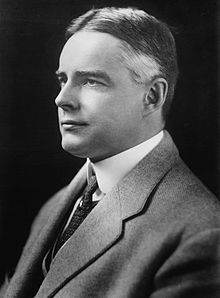Albert Ritchie
Albert Cabell Ritchie (born August 29, 1876 in Richmond , Virginia , † February 24, 1936 in Baltimore , Maryland ) was an American politician ( Democratic Party ) and governor of the state of Maryland from 1920 to 1935 .
Early years and political advancement
Ritchie first attended private schools in his home country. He then studied until 1896 at Johns Hopkins University . After studying law at the University of Maryland , he was admitted to the bar in 1898. He then worked in a joint law firm before he legally represented the city of Baltimore between 1903 and 1910. Also in 1903 he founded his own law firm together with a partner, which he ran until 1919. Between 1910 and 1913 he represented the interests of the citizens in relation to the public institutions of the city of Baltimore ( Public Service Commission ). In this capacity he fought, among other things, for a reduction in gas and electricity prices.
Between 1915 and 1919 he served as Attorney General of the State of Maryland. On November 4, 1919, he was elected as the new governor of his state as a candidate of his party against the Republican Harry Nice .
Governor of maryland
Albert Ritchie took up his new office on January 14, 1920. After he was re-elected in 1923, 1926 and 1930, he could remain in office until January 9, 1935. During his tenure, Maryland's school system improved and the state's roads expanded. The government apparatus was restructured and a new law regulating severance payments in the event of occupational accidents was passed. Ritchie was an opponent of Prohibition and thus also against the 18th Amendment to the Constitution . A miners' strike in 1922 was ended through negotiation and without violence. Governor Ritchie worked little with the federal government under Presidents Warren G. Harding and Calvin Coolidge . Due to a law that postponed the election dates in Maryland, his second term was cut by one year. The governor also promoted agriculture.
His last years as governor were overshadowed by the great global economic crisis. As a countermeasure, taxes were cut in Maryland. In 1924 and 1932 Ritchie was under discussion as a Democratic presidential candidate. In 1932 he turned down an offer from Franklin D. Roosevelt to run for vice president . In 1934, Ritchie ran again for re-election. This time he was defeated by Harry Nice. The reasons for his defeat were on the one hand the bad economic situation and on the other hand internal party tensions.
After the end of his tenure he returned to practice as a lawyer. In February 1936 he died unexpectedly in Baltimore. He was married to Elizabeth Catherine Baker, from whom he divorced in 1916. He did not remarry and remained childless.
Web links
- Albert Ritchie in the National Governors Association (English)
- Albert Ritchie in the database of Find a Grave (English)
| personal data | |
|---|---|
| SURNAME | Ritchie, Albert |
| ALTERNATIVE NAMES | Ritchie, Albert Cabell (full name) |
| BRIEF DESCRIPTION | American politician, governor of Maryland |
| DATE OF BIRTH | August 29, 1876 |
| PLACE OF BIRTH | Richmond , Virginia |
| DATE OF DEATH | February 24, 1936 |
| Place of death | Baltimore , Maryland |


